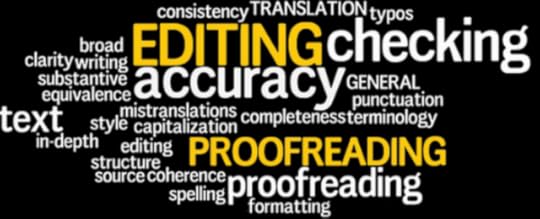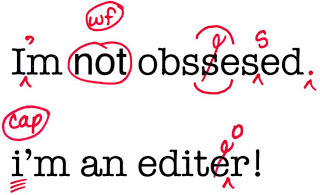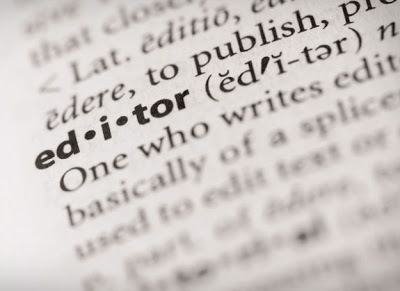SPECIES: GENUS ÉDITEUR
 SPECIES: GENUS ÉDITEUR
SPECIES: GENUS ÉDITEURFirst four words about editors—They are not God…
Now a few more words—Working with editors can be confusing and on occasion filled with frustration. I’ve worked with both the good and bad varieties, but I’ve also had the blessing of working with a great editor.
 Good editors are the most common of the genus éditeur. These generally kind examples of the species, try to understand what you are attempting to accomplish with your writing. However, they are only willing to work with you if your manuscript is (other than a finalcopy edit) publication ready. They are pleasant enough, but harried and easily distracted by their own problems or workload. They are like parents who raise free-range children, allowing them to run wild, hoping they will eventually turn out okay.
Good editors are the most common of the genus éditeur. These generally kind examples of the species, try to understand what you are attempting to accomplish with your writing. However, they are only willing to work with you if your manuscript is (other than a finalcopy edit) publication ready. They are pleasant enough, but harried and easily distracted by their own problems or workload. They are like parents who raise free-range children, allowing them to run wild, hoping they will eventually turn out okay. Bad editors are like weeds in the flower beds of your prose. They are noxious, prevalent, and can choke the life out of your manuscript. Sometimes, you can feel as if this species of editor is reveling in picking your manuscript apart and insisting on changes because if they don’t change something they don’t feel as if they are doing their job—and sometimes they do it because the can. This breed of editor can leave you feeling as if your manuscript has been bored through with a Roto-Rooter. In general, to give them the benefit of the doubt regarding their level of malevolence, these sour individuals are simply not a good match for your particular manuscript.
 Bad editors may actually be good editors when working in their favorite genre or with important authors—as opposed to working writers. However, when faced with being assigned to edit a manuscript from a genre with which they are not familiar, or simply don’t like, they can become as difficult as a four-year-old having a meltdown in the middle of the cereal aisle. They may view your manuscript as beneath their own literary aspirations. They believe they should be editing Thomas Wolfe or F. Scott Fitzgerald—you know, authors worthy of their attention—instead of wasting their time with you.
Bad editors may actually be good editors when working in their favorite genre or with important authors—as opposed to working writers. However, when faced with being assigned to edit a manuscript from a genre with which they are not familiar, or simply don’t like, they can become as difficult as a four-year-old having a meltdown in the middle of the cereal aisle. They may view your manuscript as beneath their own literary aspirations. They believe they should be editing Thomas Wolfe or F. Scott Fitzgerald—you know, authors worthy of their attention—instead of wasting their time with you. If this happens escape while you still can.
The problem is, beginning writers often confuse the above species. You have to be objective when working with an editor. Are they helping you make the manuscript better, or are they undermining the power of your words?
 Some beginning writers have a hard time overcoming the blinkers of their own writers’ narcissism. They are like mothers who believe their fat, spotty, rude child—otherwise known as their manuscript—is perfect, and woe be to anyone who doesn’t lavish praise, or who dares to change a word. Writer’s like this can’t recognize when the suggestions and changes offered by a good editor are pertinent and needed. Unable to distinguish between the bright plumage of a Good Editor and the black belly feathers of a Bad Editor, they rant and rave and become their own worst enemy. Unless they really are the equivalent of Thomas Wolfe or F. Scott Fitzgerald (not going to happen), they will find the welcome mat missing next time they want to submit a manuscript.
Some beginning writers have a hard time overcoming the blinkers of their own writers’ narcissism. They are like mothers who believe their fat, spotty, rude child—otherwise known as their manuscript—is perfect, and woe be to anyone who doesn’t lavish praise, or who dares to change a word. Writer’s like this can’t recognize when the suggestions and changes offered by a good editor are pertinent and needed. Unable to distinguish between the bright plumage of a Good Editor and the black belly feathers of a Bad Editor, they rant and rave and become their own worst enemy. Unless they really are the equivalent of Thomas Wolfe or F. Scott Fitzgerald (not going to happen), they will find the welcome mat missing next time they want to submit a manuscript.There is another breed of beginning writer at the other end of the spectrum. They can’t imagine ever disagreeing with an editor. They often end up butchering their fragile bonsai tree of a manuscript trying to please an editor, who may or may not have the best interest of the manuscript at heart.
 Great editors are rare and magical beasts. They are actually able to see what works and doesn’t work in your novel. They make considered and constructive suggestions, help you find solutions to manuscript problems, encourage you through the hard process of making changes, and become a true partner in the publishing process. If you are lucky enough to come across a Great Editor in the wild, protect them with your life. They will make you a better writer and a better person. They might not turn your manuscript into a bestseller, but they will ensure it will sell better than it would without their input.
Great editors are rare and magical beasts. They are actually able to see what works and doesn’t work in your novel. They make considered and constructive suggestions, help you find solutions to manuscript problems, encourage you through the hard process of making changes, and become a true partner in the publishing process. If you are lucky enough to come across a Great Editor in the wild, protect them with your life. They will make you a better writer and a better person. They might not turn your manuscript into a bestseller, but they will ensure it will sell better than it would without their input.But let’s get back to the point of this diatribe—Editors are not God.
As a writer, I’ve long believed the myth most editors are trolls living under their desks, snatching at any winsome manuscript trying to cross their transom. I am loath to give up this unreasonable impression, even though I now find myself turning into a troll as my own role as an editor expands.
Remember, an editor’s comments on your manuscript are opinions. We may be wrong (but probably not). Comments on your manuscript are not judgements of you as a person or even as a writer. I wrote a lot of bad crap before the scent of my pros began to become more acceptably aromatic.
Speaking for myself, I am completely capable of getting things wrong. If you send me a historical romance to edit, my tendency would be to strip down your flowing prose, excise all of the yucky moony-eyed stuff, editing you by the standards of another genre with which I am more familiar.
 Hopefully, I have evolved as an editor to the point where I don’t do this. I have grown to understand the tropes of many other genres beyond my own. I could be a good editor for a historical romance or sweet romance or even an erotic romance. However, I will never be a great editor in those genres because I have nothing to add to make a manuscript better other than the generic literary conventions. I could make such a manuscript’s construction better, but I most likely couldn’t help it sing.
Hopefully, I have evolved as an editor to the point where I don’t do this. I have grown to understand the tropes of many other genres beyond my own. I could be a good editor for a historical romance or sweet romance or even an erotic romance. However, I will never be a great editor in those genres because I have nothing to add to make a manuscript better other than the generic literary conventions. I could make such a manuscript’s construction better, but I most likely couldn’t help it sing.What does all of this mean when you submit a manuscript or work with an editor? First, when your chosen editor makes comments and suggestions, don’t take them personally. Try to be objective about them. Do they make sense? Do they make your manuscript stronger? Don’t be obnoxious, but neither be afraid to disagree. I personally am open to a back and forth literary relationship. I may not get what you are trying to do until you explain it to me. Once I understand, I can tailor my advice and encouragement.
I am certainly not the final word on the worth of a manuscript or even the changes I think should be made. No editor is. This is about your writing, not a troll’s editing. Still, as a writer, you need to be open and prepared to learn from an editor’s experience, while not allowing your vision to be derailed.
 ONE FINAL NOTE:
ONE FINAL NOTE: If you are working with and editor or a mentor in a writers’ group or writers’ conference, shopping around for other input can be a dangerous path. After offering advice, no editor or mentor wants to be told be told in a whiney voice, “But you’re telling me the complete opposite of what so-and-so said.” This type of shopping for advice from different individuals will only lead you to a cornucopia of conflicting advice, causing utter confusion and frustration for a beginning writer.
An editor or a mentor offers advice and opinions. Throwing up your arms and telling an them another writing guru gave the total opposite advice, is the quickest way to make your current editor or mentor abandon you in midstream. If an editor or mentor’s advice is conflicting with what you’ve been told, keep your own counsel, consider the advice, and make a decision about which editor or mentor your instincts tell you is right. Then—most importantly—stop shopping around and stick with the individual who serves you best.
Published on July 18, 2017 17:44
date newest »
newest »
 newest »
newest »
message 1:
by
Barry
(new)
Jul 19, 2017 04:40PM
 Basically: Good Editors help make a good book great. Poor editors can doom the project. The problem is the in - between editor who can swing things either way
Basically: Good Editors help make a good book great. Poor editors can doom the project. The problem is the in - between editor who can swing things either way
reply
|
flag



